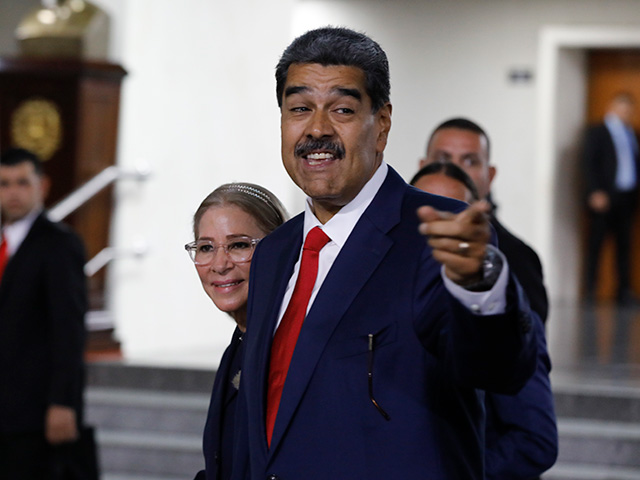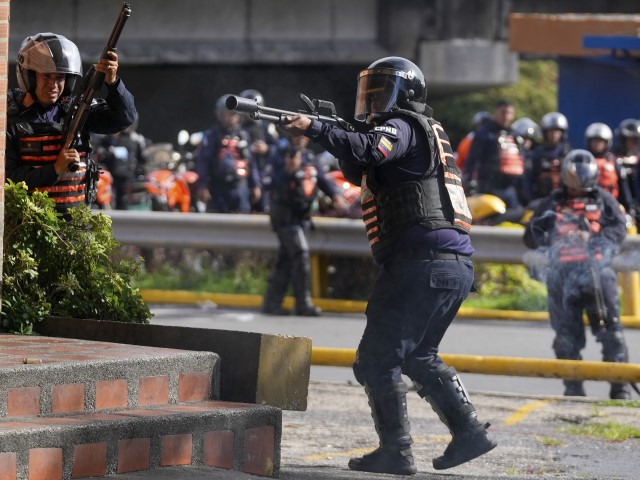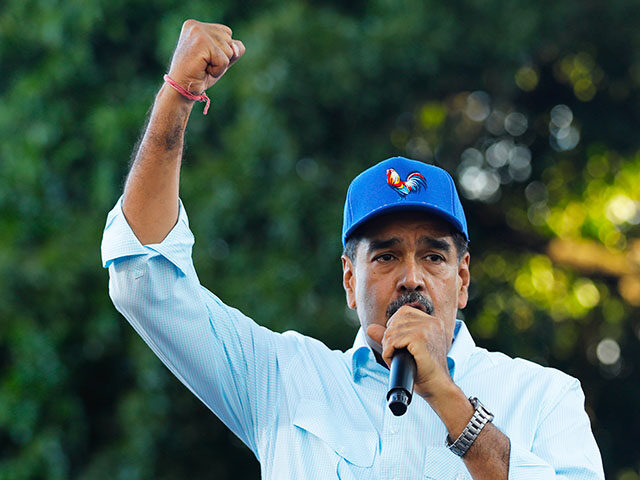Socialist dictator of Venezuela Nicolás Maduro announced on Monday that his regime would host a world congress “against fascism, neo-fascism, and similar expressions.”
Maduro said that the yet-to-be scheduled event will seek to “exchange strategies” to “fight fascism,” which he has often defined broadly to mean any opposition to hardline socialism. Maduro has for over a decade used “fascism” as a reason to violently repress political dissidents in the country. The dictator made the announcement during a Monday evening event with leaders of the ruling United Socialist Party of Venezuela (PSUV) and its allied parties.
WATCH — Watch: Billboard of Maduro Set Ablaze Amid Venezuelan Election Protests:
“A very good idea has been proposed to me, I want us to set a date very soon, to hold a world congress against fascism, neo-fascism and similar expressions, with guests from all continents,” Maduro said. “Let’s invite thinkers, intellectuals, artists, social leaders and political leaders from Africa, Asia, Europe, the United States, Latin America, and the Caribbean, etcetera, etcetera.”
“We are going to hold here in Venezuela, the world epicenter of the fight against fascism, the great congress to nourish ourselves with ideas, proposals, and refine the strategies of Venezuela, which is defending its right to live, to peace, to the future,” he continued.
Watch video:
Maduro suggested that the event should take place before October 18, when the PSUV is scheduled to hold a national congress in which the dictator will “receive proposals” from his sympathizers on his “agenda” for the next six years once he takes office for a third term in January 2025.
The Venezuelan dictator claims that he was “reelected” for a six-year presidential term after Venezuela’s National Electoral Center — loyal to Maduro — proclaimed him the “winner” of the July 28 sham presidential election. The Venezuelan electoral authorities have continuously refused to show voter data that can corroborate his claims. The nation’s top court — also loyal to Maduro — is presently undergoing a “review” of the results following a request made by Maduro.
Maduro’s claimed “victory” has been heavily called into question by the international community and the Venezuelan opposition, who have published voter data that they claim can prove that their candidate, Edmundo González, was the actual winner of the election after defeating Maduro in a landslide.
Throughout his rule, Maduro has repeatedly accused both the Venezuelan opposition — which is mostly composed of center-left parties — and dissidents of his regime of being “right-wing” and “fascists.” Maduro has accused the opposition of allegedly engaging in a “fascist coup” by contesting his “victory” in the July 28 sham election.

Venezuelan President Nicolas Maduro and his wife Cilia Flores leave the Supreme Court after speaking to the press in Caracas, Venezuela, on August 2, 2024. (AP Photo/Cristian Hernandez)
Maduro has also accused “international Zionism” of being behind a purported plot to oust him and his authoritarian regime.
“Zionism also supports the coup in Venezuela through influence in social networks,” Maduro said in remarks given in early August to the pro-Hezbollah Lebanese outlet Al Mayadeen. “My victory in the elections is the best sign of a nation’s striving for its independence, dignity and future, and that the world no longer follows the demands of Washington and the new brutal capitalist system and fascism.”
Maduro’s attempts to steal the election and once again cling to power have led to nationwide protests that the Maduro regime has responded with a brutal repression campaign led by the national guard, the police, and the regime’s other security forces, including the colectivos, armed gangs that directly serve Maduro.
Venezuelan Attorney General Tarek William Saab accused Venezuelan opposition leader María Corina Machado of being “responsible” for the protests’ 27 registered deaths and warned that she could be charged “at any moment” for the deaths of the protesters.

Police aim at protesters demonstrating against the official election results after electoral authorities certified President Nicolas Maduro’s reelection in Caracas, Venezuela on July 29, 2024, the day after the vote. (Fernando Vergara/AP)
Maduro’s announcement of an “anti-fascism” world congress comes as the Venezuelan National Assembly, which is completely controlled by PSUV lawmakers, is preparing an “anti-facist” law that will punish dissidents who engage in actions that the socialist regime deems “fascist or neo-fascist” with jail time, fines, or the dissolution of non-government organizations.
Last week, U.N. Human Rights Chief Volker Türk expressed his concerns over the Maduro regime’s “anti-fascism” bill in remarks given as part of the Maduro regime’s continued brutal crackdown and arbitrary arrest of protesters and dissidents.
“I urge the authorities to refrain from adopting these and any laws that undermine civic and democratic space in the country – in the interest of social cohesion and the future of the country,” Türk said. “I am also worried that some individuals have had their passports suspended, which seems to be an act of reprisal for their legitimate work in the country. All this is exacerbating tensions and further fragmenting the social fabric of Venezuela.”
“The international community has a fundamental role to promote inclusive dialogue, with human rights of all Venezuelans at heart. As always, my Office stands ready to assist,” he continued.
In 2017, socialist lawmakers passed a similar “law against hatred and fascism” to punish “hate speech” in Venezuela. The legislation granted the Maduro regime the ability to punish individuals who publish messages that the regime deems “hateful” — including individuals who have simply expressed criticism of the precarious state of Venezuela’s basic utilities after more than two decades of socialist mismanagement have left them in a precarious state.
Christian K. Caruzo is a Venezuelan writer and documents life under socialism. You can follow him on Twitter here.

COMMENTS
Please let us know if you're having issues with commenting.